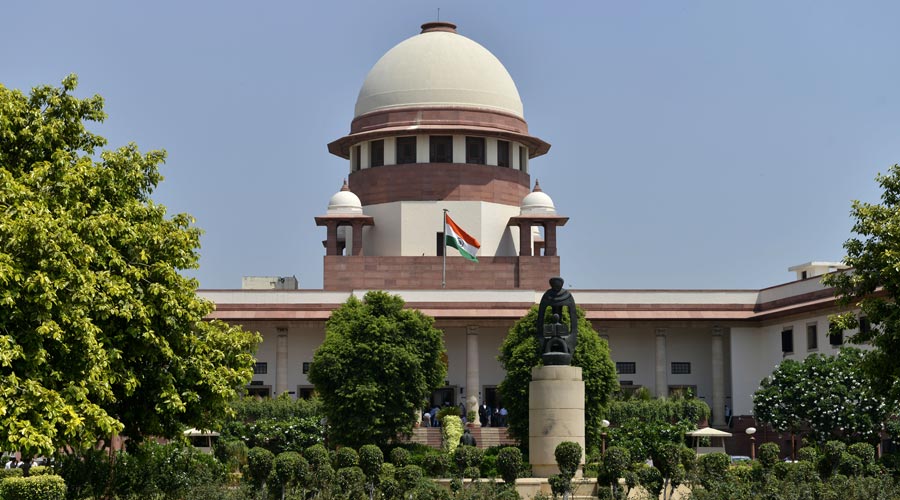The Supreme Court said on Thursday it is not the "interpreter" of the Holy Quran and it has been argued before it in the Karnataka Hijab ban matter that courts are not equipped to interpret religious scriptures.
The apex court, which was hearing arguments on a batch of pleas challenging the Karnataka High Court verdict refusing to lift the ban on Hijab in educational institutions of the state, made the observation after a counsel for one of the petitioners said the judgement under challenge is touching upon the Islamic and religious perspective.
"The one way is to interpret the Quran.... We are not interpreters of the Quran. We cannot do it and that is the argument raised also that the courts are not equipped to interpret religious scriptures," a bench of Justices Hemant Gupta and Sudhanshu Dhulia said.
The top court heard submissions of several lawyers, who appeared for the petitioners and argued on various aspects including the wearing of Hijab being a matter of privacy, dignity and also autonomy, and whether the practice of wearing it is essential or not.
One of the advocates argued the way the high court interpreted the matter on Islamic and religious perspective was a "wrong assessment".
"The high court might have said anything, but now we are taking an independent view in the appeals," the bench maintained.
Advocate Shoeb Alam argued that wearing Hijab is a matter of one's dignity, privacy and autonomy.
"On one end, I have my right to education, right to go to school, right to get inclusive education with others. On the other hand, there is my other right, which is right to privacy, dignity and autonomy," he said.
Alam said the impact of the government order (GO) banning Hijab in educational institutions with prescribed uniforms is that "I will give you education, give me your right to privacy, surrender it. Can the State do it? The answer is an emphatic 'no'."
He said the State cannot come up with a GO asking a person to surrender her right to privacy at the doorstep of the school.
Senior advocate Kapil Sibal suggested that the matter should be referred to a Constitution bench.
"Wearing of a Hijab is the expression of what you are, who you are, where are you from ," he said.
Sibal said the question is if the right to wear Hijab is available to a woman at a public place, is her right extinguished when she enters a school.
"You cannot destroy me," he argued, adding Hijab is now a part of the persona and also a part of the cultural tradition.
Senior advocate Colin Gonsalves said the most important issue in this case is whether the practice of wearing Hijab is essential to religion or not.
He contended once the practice has been established, it is covered by Article 25 of the Constitution.
Article 25 of the Constitution deals with freedom of conscience and free profession, practice and propagation of religion.
Gonsalves argued the high court judgment is a verdict where the perception is of the "majority community", where the minority point of view is seen "very partially and very wrongly".
"It is basically a majoritarian judgment. The judgement read as a whole is basically from a majoritarian perspective point of view. It does not conform to the kind of constitutional independence that a judgement ought to have," he said, while arguing the apex court should set aside the judgement on this ground alone.
Gonsalves wondered, "What is the difference? If you can wear a turban, why cannot you wear a Hijab?".
"The 'dress', 'undress' arguments in unfortunate because Muslim girls are in fact undressed if they are told to take off the Hijab by the security guard .," he said.
While hearing the Hijab controversy, the Supreme Court recently remarked if the right to dress would also mean a right to undress.
The remark by Justice Gupta was in response to an argument that the right to dress forms part of the fundamental right to freedom of speech and expression.
Gonsalves argued that constitutional morality, in the context of minority rights, is the ability to see an issue through the eyes of the minority.
"It has to be cultivated. A person from the majority may not get the answer quickly, may not understand the intensity of feelings quickly," he said.
Senior advocate Meenakshi Arora, appearing for one of the petitioners, said the second largest religion that is practised across the world is Islam.
She said across the country, the people practising Islam recognise wearing Hijab as a part of their religious and cultural practice.
At the outset, senior advocate Dushyant Dave, appearing for one of the petitioners, told the bench he would take a little longer time to argue the case.
"This is too serious a matter. I would like to assist your lordships to the best of my ability," he said.
Dave said the court should have referred this matter to a larger bench.
"My endeavour is to persuade your lordships as to why this judgement is required to be set aside. This matter is far too serious than a uniform," he said, adding, "this matter requires very serious attention by your lordships. Your lordships are the custodian of the fundamental rights of the citizens."
The arguments in the matter will continue on September 19.
The state government's order of February 5, 2022 by which it had banned wearing clothes that disturb equality, integrity, and public order in schools and colleges, was referred to in the apex court.
Several pleas have been filed in the top court against the March 15 verdict of the high court holding that wearing Hijab is not a part of the essential religious practice which can be protected under Article 25 of the Constitution.










